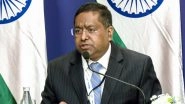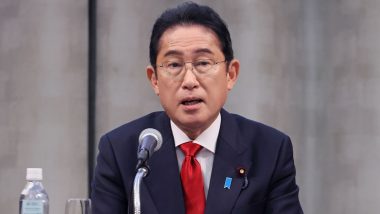Tokyo, March 26: Japanese Prime Minister Fumio Kishida turned down a meeting with former Chinese Ambassador to Japan Kong Xuanyou before his departure in late February, several sources, cited by Kyodo News have confirmed. This unprecedented move is an indication of how strained the relations between the two countries are, Kyodo News reported.
Many of Kong's predecessors had farewell meetings with Japanese premiers, but Kishida broke the tradition due to worsening public opinion regarding Chinese vessels' repeated entry into the waters near the Tokyo-controlled Senkaku Islands and the earlier flights of suspected Chinese spy balloons over Japan, according to the sources mentioned by Kyodo News. India Summons High Commissioner of Canada Over Protests by Khalistan Supporters, Seeks Explanation for 'Security Breach' (Watch Video).
Kong requested an in-person farewell from the Japanese government in January; he was followed by former Chinese Assistant Foreign Minister Wu Jianghao in March. Tokyo declined, claiming a "schedule conflict" for Kishida, they said.
Kong instead met with Foreign Minister Yoshimasa Hayashi, but his government did not make this meeting public, the sources added. While prime ministers are ranked above ambassadors, a government source claimed that the denial of Kong's request "did not raise any problem in terms of diplomatic protocol."
Japan felt it was essential to "take a reciprocal approach" because a meeting between former Japanese Ambassador to China Yutaka Yokoi and Chinese President Xi Jinping did not take place before the envoy's departure in 2020, the sources, mentioned by Kyodo News, added.
As the two Asian neighbours celebrate the 45th anniversary of the 1978 bilateral Peace and Friendship Treaty, Tokyo and Beijing have been attempting to normalise relations by examining the possibility of Hayashi visiting China this year.
But bilateral relations remain unstable despite growing tensions between China and the United States, Japan's key security ally, as well as Beijing's military pressure on Taiwan and its strong links to Russia throughout Moscow's invasion of Ukraine.
Only one other of the five Chinese ambassadors to Japan who have served since 2001 was unable to meet the prime minister before departing for China. In September 2007, Wang Yi, now China's top diplomat, left without ever seeing the then Prime Minister Shinzo Abe, who abruptly declared his decision to resign as prime minister owing to his failing health. US: Pro-Khalistan Supporters Threaten Indian Ambassador to US Taranjit Singh Sandhu, Embassy Staff in Washington (Watch Video).
Kong's immediate predecessor Cheng Yonghua's lunch was hosted by Abe in April 2019 at his official residence, and the two met in the prime minister's office when Kong arrived in Japan in June of the same year.
In 2012, Abe returned to power and established himself as Japan's longest-serving leader before he was shot dead last year while giving an election campaign address. China claims the Senkaku Islands in the East China Sea, which are under Japanese control, as Diaoyu frequently deploys ships into the area, Kyodo News reported.
(The above story is verified and authored by ANI staff, ANI is South Asia's leading multimedia news agency with over 100 bureaus in India, South Asia and across the globe. ANI brings the latest news on Politics and Current Affairs in India & around the World, Sports, Health, Fitness, Entertainment, & News. The views appearing in the above post do not reflect the opinions of LatestLY)













 Quickly
Quickly


